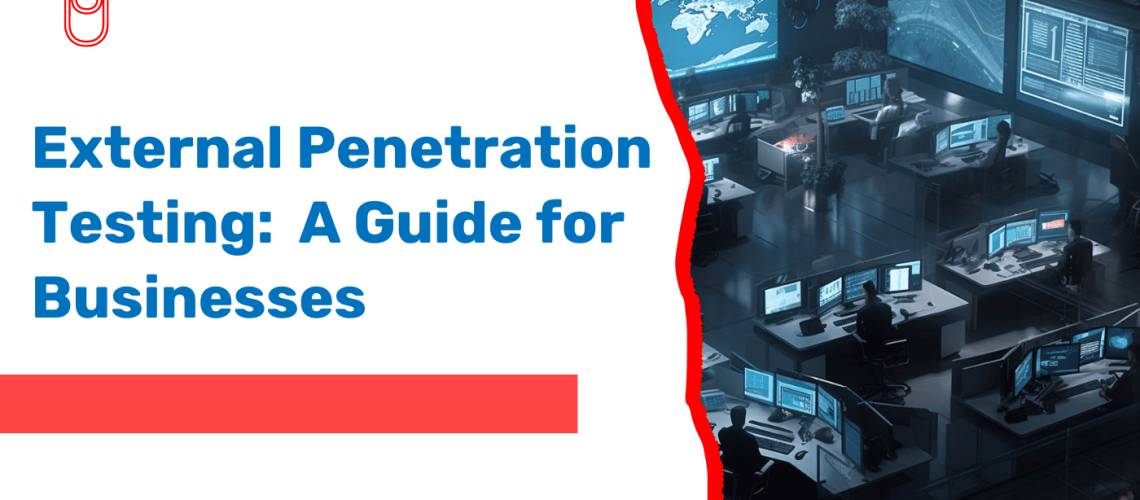Cyber threats are more sophisticated and prevalent than ever before. To safeguard their valuable data and maintain customer trust, companies must employ robust security measures. One essential strategy in the fight against cybercrime is external penetration testing. But what exactly is it, and why is it so beneficial to businesses? Let’s delve into the details in an easy-to-understand manner.
What is External Penetration Testing?
External penetration testing, often referred to as “external pen testing,” is a simulated cyber-attack against a company’s external network to identify vulnerabilities that could be exploited by malicious hackers. Unlike internal penetration testing, which focuses on threats within the company’s internal network, external pen testing examines the security of the systems exposed to the internet, such as websites, email servers, and firewalls.
During an external penetration test, ethical hackers, also known as penetration testers, use various tools and techniques to mimic real-world cyber attacks. Their goal is to uncover weaknesses in the company’s external defenses before actual cybercriminals can exploit them. The results of these tests provide valuable insights into the organization’s security posture and help in strengthening its defenses.
The Process of External Penetration Testing
The process of external penetration testing typically involves several key steps:
Planning and Scoping: The first step is to define the scope of the test. This includes identifying the specific systems and assets to be tested, understanding the company’s security policies, and setting the goals for the test. Clear communication between the testers and the company is crucial at this stage.
Reconnaissance: In this phase, the penetration testers gather information about the target systems. They look for publicly available data, such as domain names, IP addresses, and employee details. This information helps them understand the target environment and plan their attack strategies.
Scanning: Next, the testers use automated tools to scan the target systems for vulnerabilities. They look for open ports, outdated software, misconfigurations, and other weaknesses that could be exploited.
Exploitation: This is where the testers attempt to exploit the identified vulnerabilities. They try to gain unauthorized access to the systems, steal data, or disrupt services, all while ensuring they do not cause actual harm. The goal is to demonstrate the potential impact of a real attack.
Analysis and Reporting: After completing the tests, the penetration testers analyze their findings and prepare a detailed report. This report outlines the vulnerabilities discovered, the methods used to exploit them, and the potential risks to the company. It also provides recommendations for remediation.
Remediation and Retesting: The final step is for the company to address the identified vulnerabilities based on the recommendations. Once the issues are fixed, a retest is often conducted to ensure that the weaknesses have been effectively mitigated.
Benefits of External Penetration Testing
External penetration testing offers numerous benefits to businesses, regardless of their size or industry. Here are some of the key advantages:
1. Identifying Vulnerabilities Before Hackers Do: The primary benefit of external penetration testing is that it helps identify and fix security weaknesses before malicious hackers can exploit them. By proactively addressing these vulnerabilities, companies can prevent data breaches, financial losses, and damage to their reputation.
2. Enhancing Security Posture: Penetration testing provides a clear picture of a company’s current security posture. It highlights areas that need improvement and helps in prioritizing security investments. Regular testing ensures that the company’s defenses are up-to-date and effective against evolving threats.
3. Meeting Compliance Requirements: Many industries are subject to regulatory requirements that mandate regular security assessments. External penetration testing can help companies comply with standards such as the Payment Card Industry Data Security Standard (PCI DSS), the Health Insurance Portability and Accountability Act (HIPAA), and the General Data Protection Regulation (GDPR). Compliance not only avoids legal penalties but also builds trust with customers and partners.
4. Building Customer Confidence: Customers are increasingly concerned about the security of their personal information. By conducting regular penetration tests and demonstrating a commitment to security, companies can build customer confidence and loyalty. A strong security posture is a competitive advantage in today’s market.
5. Training and Awareness: Penetration testing also serves as a valuable training exercise for the company’s IT and security teams. It helps them understand the tactics used by attackers and improves their ability to detect and respond to real threats. Additionally, the findings from penetration tests can be used to raise awareness about security best practices across the organization.
6. Reducing Downtime and Financial Losses: Cyber attacks can lead to significant downtime and financial losses. By identifying and mitigating vulnerabilities, penetration testing helps prevent disruptions to business operations. It ensures that critical systems and data are protected, minimizing the risk of costly incidents.
Conclusion
Cyber threats are constantly evolving, external penetration testing is an indispensable tool for businesses. It provides a proactive approach to identifying and addressing security vulnerabilities, enhancing the overall security posture, and ensuring compliance with regulatory requirements. By investing in regular penetration testing, companies can protect their valuable assets, build customer trust, and stay ahead of potential cyber threats.
External penetration testing is not just a technical exercise; it is a strategic investment in the company’s future. By understanding its importance and benefits, businesses can make informed decisions to safeguard their digital assets and maintain a strong defense against cyber adversaries.
Contact SOClogix today to learn how the SOClogix Penetration testing team can assist your organization’s needs.


